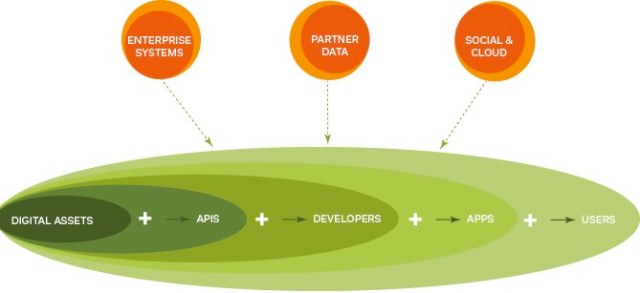Apigee has launched a new big data analytics platform that extends the company’s mission beyond API management and into a new space that uses apps and data from APIs and other sources to gain context and insight.
Here’s the problem as Apigee sees it. Let’s say you have an app and an API. All is going well — developers are using it and as a result the app is getting great traction. Then, for no explainable reason, a few of the core members of the community have suddenly stopped having much interest.
The new service, Apigee Insights, looks at the community and draws connector points to create a better context about the individual and the community. It draws on different data points, such as from GitHub, API traffic, and Google analytics for its developer web pages to get a deeper understanding.
Anant Jhingran, Apigee vice president of products, said the goal is to get a 360-degree view of the developer. The results may have some noise, but it will also have signals to help customers form conclusions. Apigee Insights is a three-tier product that explores structured, unstructured and semi-structured data.
Apigee addresses the confusion many enterprise shops face at the intersection of IT and software development. The infrastructure is radically changing and apps are populating it to meet all kinds of needs. It may be to use time series data from a company like TempoDB that it can then use to connect to different apps. All that data is contextual. And as more data points connect, it will resemble a fabric that can glean all kinds of insights. Apigee Insights, which will also include a consulting component, helps customers stitch those disparate data points. This gives the customer the capability to see beyond the immediate, structured data from such sources as retail transactions that they have become so accustomed to viewing through relatively heavyweight technologies that have long served as the infrastructure for understanding the market and customer behavior.
This process worked okay in a pre-API economy, but, now, apps are part of a long, weaving, intersecting chain of apps that come and go depending on the level of API traffic and developer interaction. It’s what Apigee Vice President of Strategy Sam Ramji describes as API Darwinism.
The market Apigee is addressing is a big one but also filled with competitors vying to compete for customers that see the value in data analysis. There are the traditional data warehouse competitors like Teradata, EMC, Oracle and SAP. Competitors in the API management space like Layer 7 Technologies and Mashery both have data analytics platforms. Layer 7 offers analytics to help companies better understand performance issues. Mashery offers performance metrics, as well.
But Apigee’s service analyzes the data from different sources to help gain context. That will have a value for companies that realize the insights that can be learned from all that data that is being generated at unprecedented rates.

